
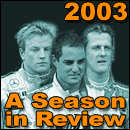 A Touch of Greatness
A Touch of Greatness Atlas F1 GP Correspondent
He has achieved what no one achieved before him. He has won more than was ever conceivable. Michael Schumacher stands alone at the top of every record table in Formula One, bar one. Love him or hate him - and there's plenty of both - the German is a phenomenal driver whose success in the sport will not be matched for decades to come. Timothy Collings, who's known the German since his early days of innocence, pays tribute to a man who was gifted with speed and was born to race to the top
Gifted with speed, untouched by outside temptations, Michael Schumacher was born to be a racing driver and he has fulfilled that destiny by delivering six, yes, six, drivers' World Championship titles in arguably the greatest career of all in the history of Formula One. And, oh, yes, along the way, he has managed to accumulate more money than Juan Manuel Fangio probably dared to imagine and certainly enough to compare favourably with any year in the life of the Argentine economy.
But riches and fame were never the goal for this extraordinary man who set out in racing from ordinary and plain beginnings in Kerpen, in the flatlands of northern Germany, near Cologne, and who wanted nothing more in his formative years than the thrill of speed on four wheels at the local kart track where his late mother Elisabeth made the hot dogs and his father Rolf helped out, in between shifts in his work with various builders.
He was a bricklayer. The family were not poor, but neither were they rich. Money was always in short supply and, because of that, when Michael began to race and win, race again and win again, and seek competition beyond the district, his embryonic career needed the help of generous local sponsors. One, a carpet salesman, put his hand in his pocket. Others bought parts. His father helped where he could. Another man took him to the more far-flung events.
Childhood friends, his contemporaries and competitors in those long-lost days of innocence and youth, travelled with him, often to add their support when they raced. The long journeys, sometimes out of Germany, to France, or Italy, provided early experience and helped him understand the sacrifices required to reach the top. They were a metaphor, too, for his life and his career in which he has always been willing to ignore any distractions as he toiled with utter dedication on the task in hand.
Yet it has not been without fun, this high-speed odyssey from nowhere in the dreary plains of suburbia to the palatial wealth of a waterside home overlooking Lake Leman in Switzerland and a life as rich in peace, beauty and nature now as it has also been in the accumulation of dollars, marks, pounds and euros, not to mention trophies and championships. Yes, Michael Schumacher has it all. And, yes, he has earned it.
That Schumacher is a worker and a fighter, not some aristocratic playboy with an affection for the idea of motor racing, was recognised early and immediately by those who are in tune with the same vibes: Eddie Jordan, Willi Weber, Tom Walkinshaw and Flavio Briatore, all men who worked their own passages in the world, risk-takers who lived every day to win and succeed. On Sunday night in Suzuka last weekend, Briatore was almost speechless, but not quite.
He was not surprised by Schumacher's scrap for a point to secure his sixth title. But he wanted to make sure people understood that beneath the veneer of the polished man in red was the same street-fighting racer who had grabbed one title, in 1994, after a collision with Damon Hill in Adelaide, and lost another in Jerez, in 1997, after crashing into Jacques Villeneuve. Neither of his opponents ever forgave him. Nor did he expect it. In the world of this racing man, there are winners and losers.
"What can I say?" said Briatore. "He has done very well. He is very strong. He is the best driver, you know. But, I don't think this year has been his toughest fight. His toughest fights were with Hakkinen, with Villeneuve and with Damon. After those three, I don't see anyone in the picture any more. He has shown this year, though, that he is fighting again. In the last three races, he showed that and the key was the race, in the wet, in America. He has had a very good season, again, but I don't know what he will do now or how long he will carry on."
Mention of the wet, or scrapping for survival, or high-tension showdowns in the last decade and the chance is that, in the next few words, Michael Schumacher will be introduced. He is the best in the wet, the toughest competitor, the coolest racer and the best man of all at obeying orders from the pit wall when he has utter confidence in the strategy that lies behind them.
Or the emotional heat-hazy days at Monza when the scarlet hordes' dreams were resurrected by his huge sense of duty and utter devotion to gaining a result? Rain, heat, problems, accidents, traffic; he has made light of them all. And he has avoided talk of any direct comparisons with Ayrton Senna, or Fangio, or other great drivers of the past because he has too much respect for them, and others, to indulge in any kind of false inflation of his own ego. It is enough that he has succeeded in delivering his own ambitions for himself and his team.
He loves success, to share it with his team members. He obeys the disciplines of the team and its teamwork because he has always loved to share the joys. It is why he plays football so often. He revels in competition, in the contest with himself to improve his physical condition (if possible) and his skills and the match that throws one team's resources against another.
"I think that, as a person," said Ross Brawn, the Ferrari technical director who has masterminded all six of the Championships collected by Schumacher. "I think you all see his ability. But what you don't see is him - as a person. And I think the way he works with the team, the respect he has for his team, the encouragement and the motivation he gives to his team, well, I think it is quite exceptional. And we can all see the results. He is obviously, very clearly, an outstanding racing driver, but he's a tough guy. And he is an outstanding human being as well."
That may sound contradictory. Yet it is not. Schumacher has always been tough - on himself and those who want to take his time or his concentration. And he is always humane and helpful to those who are polite and wait and show respect. In his early days, when he signed off a column for Camel, his team's sponsors, he would always take the trouble to talk his thoughts through in detail and to ask and answer questions.
"I would say he is very focussed," said Jean Todt. "He has a passion for his job, he is very professional, he's always available and when he needs something, he is pushing, he wants to understand and he is very curious. On the other side, I think that Ferrari has given him fantastic support, a fantastic car, fantastic engine and a fantastic package."
But, Mr Todt, one feels it is necessary to point out, it was only after Michael had arrived at Maranello that the team began to pull together and develop. His talent and his determination and focus were the most important factors. Without Michael Schumacher, this great era of Ferrari dominance would never have happened.
And now the talk is of 'how much longer?' When will the Red Baron retire? Will he follow Sir Jackie Stewart's advice and bow out at the top, the very top? Can the men in his inner team - Todt, Brawn, Rory Byrne and the rest - stick at it any longer? Are they not exhausted by the pace and fury of it all? They are all multi-millionaires with lives to lead.
"This will stop one day," Brawn told reporters at Suzuka. "And I think for all of us, it is going to be very painful and we don't want to face that pain any earlier than we have to. We still enjoy winning races. As I said, after the Indianapolis race, Michael was choked - and he has won 70 races, or whatever, and there's still a passion there for all of this. So, while that passion is there, we'll do it. And we will carry on doing it. One day it will stop. Not next year, but I don't know when."
It seems a long time ago, already, that Michael and his brother Ralf slipped away from Imola to be at their dying mother's bedside midway through the San Marino Grand Prix. Michael won that race. It seems even longer ago that he turned up fresh-faced and eager to please in Monza for his first Italian Grand Prix, having just signed for Benetton after one race with Eddie Jordan.
The interview was performed with aplomb and ease, the race was won, the football-mad driver rushed home for training with the village team in Switzerland after just another day at the office, leaving the writer to smile in bemusement at the way the world works.
He is a man who has been operating on another sphere of energy, control and ambition for so long that he is out of touch to many ordinary people now, but he shows, when he allows his emotions to rise and escape through the weakened defences of his personal mind and body management systems, that he is just like anyone else.
He can be silly, irresponsible and wild, particularly after a drink at an end-of-season party. He can even be boorish at times, but these are only nit-picking attempts at finding faults in a man whose general levels of demeanour since he was humiliated in the aftermath of Jerez, in 1997, have been exemplary.
Schumacher is growing up now. He is matured and stronger than ever. He knows what it takes to win in a clean fight and he is ready to do it again and it is going to be just as difficult as ever for anyone to stop him. After a winter of relaxation and fun - at home, in Norway, or in Italy - he will be recharged. And he will be ready to go again, just as he always was at Kerpen in the early days.
He has beaten them all. From Andrea de Cesaris to Kimi Raikkonen, Nelson Piquet to Juan Pablo Montoya, Alain Prost to David Coulthard and Damon Hill to Mika Hakkinen. He has broken all the records, bar one. He has raised the eyebrows of every new spectator as certainly as he has left even the most loquacious of commentators grappling for air and words. He has centralised every team around his talent and exploited any weaknesses he can find in his rivals.
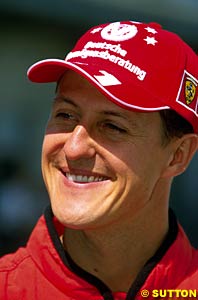 He has raced with utter ruthlessness in pursuit of a result and in perfect harmony with nature and the mechanical perfection of his cars. He has learned to talk freely in his own language and in English and he has, by popular consent, deserved to graduate in the politics of the pitlane and the world. He is as fit as a flea, as strong as a bear and as concentrated and brave as a matador in the midst of a torrid afternoon's work in the heat.
He has raced with utter ruthlessness in pursuit of a result and in perfect harmony with nature and the mechanical perfection of his cars. He has learned to talk freely in his own language and in English and he has, by popular consent, deserved to graduate in the politics of the pitlane and the world. He is as fit as a flea, as strong as a bear and as concentrated and brave as a matador in the midst of a torrid afternoon's work in the heat.
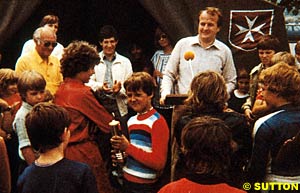 He has worked harder each day than any other driver known to Formula One so that even if he has less talent than some of the legends, he has earned his place in their pantheon. Five-time champion Fangio, a man of dignity who respected all workers, would have understood the effort that Michael has put in to perfect his strengths, to erase his weaknesses and to turn himself into the most extraordinary winning machine to have been produced by humanity in this sport of speed and danger.
He has worked harder each day than any other driver known to Formula One so that even if he has less talent than some of the legends, he has earned his place in their pantheon. Five-time champion Fangio, a man of dignity who respected all workers, would have understood the effort that Michael has put in to perfect his strengths, to erase his weaknesses and to turn himself into the most extraordinary winning machine to have been produced by humanity in this sport of speed and danger.
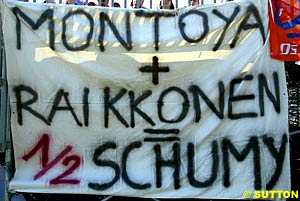 Everyone remembers special moments - like that race at the Nurburgring, in 1995, when Schumacher used the chicane as a private passing place and sliced through the opposition without pausing for breath as he slalomed towards an extraordinary triumph on his way to his second drivers' title. Or the one in Spa-Francorchamps that year when he started nearer the back of the grid than the front, but spread-eagled the field with his genius.
Everyone remembers special moments - like that race at the Nurburgring, in 1995, when Schumacher used the chicane as a private passing place and sliced through the opposition without pausing for breath as he slalomed towards an extraordinary triumph on his way to his second drivers' title. Or the one in Spa-Francorchamps that year when he started nearer the back of the grid than the front, but spread-eagled the field with his genius.
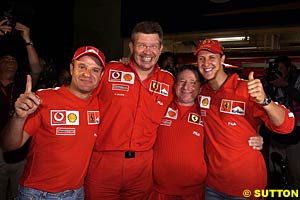 He wanted to get things right. Many drivers then, many more since, would not have bothered. Some would have asked their ghost-writers to make it all up and some have taken good money, for many years, without even once offering an honest opinion that was used in the columns that bore their own names. Such attention to detail has always been a hallmark of Schumacher's approach to life: he is punctual, hard-working, modest in his humanity and he sets himself the highest standards. He has to be tough to do that and succeed.
He wanted to get things right. Many drivers then, many more since, would not have bothered. Some would have asked their ghost-writers to make it all up and some have taken good money, for many years, without even once offering an honest opinion that was used in the columns that bore their own names. Such attention to detail has always been a hallmark of Schumacher's approach to life: he is punctual, hard-working, modest in his humanity and he sets himself the highest standards. He has to be tough to do that and succeed.
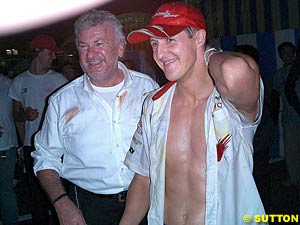 It seems ages, too, since an interview he gave this correspondent one summer at Magny-Cours during testing in his early days with Ferrari. Due to various reasons, the interview took place as Schumacher sped to Nevers airport, at the wheel of a big Lancia saloon car, in a secret weaving race through the French rush hour traffic against one of his oldest friends and close neighbours, Jean Alesi, who was driving a new Porsche boxster.
It seems ages, too, since an interview he gave this correspondent one summer at Magny-Cours during testing in his early days with Ferrari. Due to various reasons, the interview took place as Schumacher sped to Nevers airport, at the wheel of a big Lancia saloon car, in a secret weaving race through the French rush hour traffic against one of his oldest friends and close neighbours, Jean Alesi, who was driving a new Porsche boxster.
Please Contact Us for permission to republish this or any other material from Atlas F1.
|
Volume 9, Issue 42
Atlas F1 Exclusive
A Touch of Greatness
Interview with Kimi Raikkonen
Interview with Jock Clear
Ann Bradshaw: View from the Paddock
2003 Japanese GP Review
2003 Japanese GP Review
The Boardroom View
The Pressure Game
Stats Center
SuperStats
Charts Center
Columns
Season Strokes
On the Road
Elsewhere in Racing
The Weekly Grapevine
> Homepage |